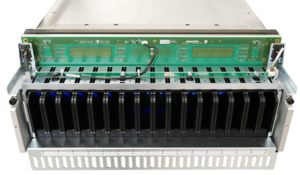Advantest Rolls Out Thermal Control Products for MPT3000 Solid-State Drive Test Platform
Independent Thermal Control Board and Engineering Thermal Chamber Targeting Early SSD Product Development Stages with Per DUT Thermal Control
In August, Advantest announced two new additions to its MPT3000 solid-state drive (SSD) test platform. The Independent Thermal Control (ITC) device interface boards (DIBs) and Engineering Thermal Chamber (ETC) target early engineering adoption of the MPT3000 by enabling efficient, small-batch engineering, quality assurance and early test development for SSD devices.
Advanced computing standards, such as PCI Express fifth-generation (PCIe Gen 5), enable higher-speed SSD devices with greatly expanded bandwidth for use in advanced data centers and other demanding storage applications. These faster, higher-capacity devices must be characterized and tested in thermal environments that accurately replicate operating temperatures.
Designed for device test qualification and validation, the ETC is integrated into the MPT3000ES3 test system to handle the highest-power PCIe Gen 5 DUTs. The unit enables accurate environmental temperature control within the chamber from -10 to 85°C, utilizing air flow to accurately condition up to 32 4-lane DUTs. The ETC is well suited for characterizing small batches of DUTs at a set temperature within the range stated.
Created for high-volume production test and qualification, the MPT3000HVM3 test systems support ITC DIBs, allowing the user to accurately set and maintain a constant drive temperature. Using active temperature feedback from the DUT, the fan speed is controlled to maintain a constant DUT temperature. This is an improvement from standard DIBs, which supply constant cooling air and allow the DUT temperature to fluctuate with the wattage of the test cycle. ITC DIBs feature air channels on either side of the DUT to maintain a constant DUT temperature on all DUTs, even during asynchronous testing cycles.


